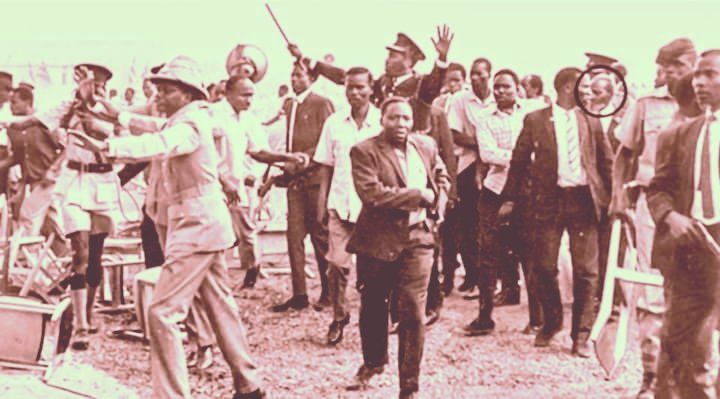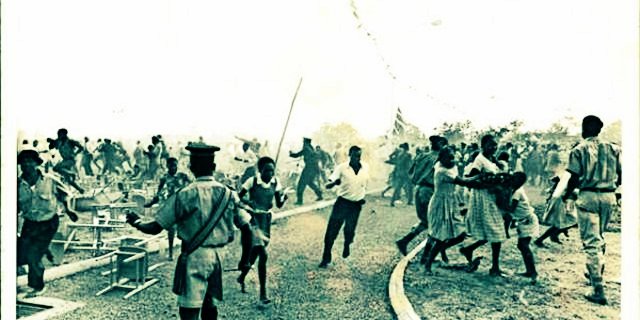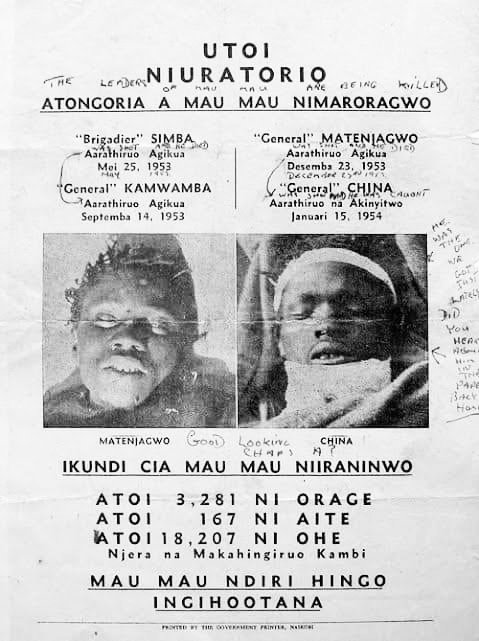
POLITICS OF BETRAYAL IN KENYA
The fallout between Kenyatta and Odinga & the subsequent assassination of Mboya,extinguished the dream of the anti-colonial movement for independent Kenya & laid the foundation for betrayal that still stalks Kenyan politics to date.
***THREAD***

The fallout between Kenyatta and Odinga & the subsequent assassination of Mboya,extinguished the dream of the anti-colonial movement for independent Kenya & laid the foundation for betrayal that still stalks Kenyan politics to date.
***THREAD***


Kenya became a republic on 12 December 1964. However, the threat to the new republic’s unity was a mixture of ideological accusations in the context of the Cold War and personal ambitions.
Because of his age, Kenyatta was not expected to last on the political scene for long.
Because of his age, Kenyatta was not expected to last on the political scene for long.
By virtue of being the vice-president, Odinga stood a better chance of being his successor. But this was not going to be possible. First because tribalism had become entrenched in Kenyan politics. Second, the British still pulled the strings behind the stage.
Odinga’s links with the Soviet made him unacceptable to the British who detested Communism. They considered him a security threat to British settlers and businesses in Kenya. This suspicion was further compounded by Odinga’s stand on land which he insisted belonged to Africans...
... arguing that there was no reason to compensate settlers who had grabbed it from Africans.Therefore, the British took every step to remove him from the line of succession. Helping them to achieve their goals were their own house rats such as Charles Njonjo.
This Kikuyu elite while accusing Odinga of being a Communist was mainly motivated by tribalism.Tom Mboya had come to realise that he had extraordinarily little chances of succeeding Kenyatta.Rather than see his arch political rival become a successor...
... he ganged up with these Kikuyu political barons to fight Odinga by consistently painting him as a Communist. Mboya as the KANU secretary general would be used by the Kikuyu elitist to introduce laws that would cripple Odinga politically.
To cushion himself from intrigues, Odinga continued to build his own loyal cadres within the cabinet, parliament and KANU .Assisting him were his two hatchet men, Pio Gama Pinto and Bildad Kaggia...
... Using his own popularity and Pinto's organization skills he managed to entice a majority of backbenchers on his side and was trying to win more using had cash and gifts from communist countries.
In the Kikuyu countryside, where Kaggia was his point man, he was gradually getting the necessary support among the disgruntled landless Kikuyu.
To establish his influence in KANU,he set up the Lumumba Institute which was to indoctrinate party officials through training.This project was overseen by Pinto,unfortunately he was assassinated days before the first students made up of party officials arrived at the institute.
Odinga’s other target in his effort to outmanoeuvre his political rivals was to control the press. His men now controlled the press office, the radio and the Kenya News Agency courtesy of his useful ally Achieng Oneko the Minister for ...
... Broadcasting and Information who had flooded the information services with Soviet trained expatriates. Operating behind the scene and overseeing the editorial at the Kenya News Agency was Pio Gama Pinto.
In 1965 Jomo decided that it was time for a confrontation with Odinga because of his stand on land. The man used in curtailing Odinga’s political power was Mboya.Despite being strategist for the Kikuyu political elite in their manoeuvre against Odinga,Mboya was not trusted fully.
Mboya’s relationship with Kenyatta in particular could be described as that of convenience. He viewed Kenyatta as a tribalist, but needed his prestige and the support of his Kikuyu tribe.
Kenyatta on the other hand needed Mboya’s brilliance but distrusted him and resented his American connections which he saw as threat to his rule. Nevertheless, he was the best weapon to finish Odinga, after which he could be discarded.
In what was becoming an open war against Odinga & his allies,Kenyatta took the battle to Kaggia’s backyard & blasted him for advocating for communist style takeover of whites land.Kaggia had told people that they should have free land since it belonged to them before whites came.
Kaggia you are advocating for free things what have you done for yourself?" Kenyatta asked Kaggia who was seated close to him. “I personally have been to Moscow university & I can assure you that even in so called communist country such as Russia man gets anything for nothing."
In a warning directed at Odinga and his allies Kenyatta said, “I fought the colonialists with all my strength and if any African wants to fight me let him try."
Just after this broadside Mboya led the takeover of Odinga’s Lumumba Institute explaining that it was being used to oppose govt.Weeks later guns were planted in Odinga’s office at Jogoo House by the police,with rumours circulating in that he was planning to overthrow the govt.
Odinga was also left a lame duck vice-president after key functions under his docket were transferred to Charles Njonjo.
That same month Njonjo visited Britain where he informed the Secretary of State that they had taken every step to prevent Odinga from visiting state house & could only meet Kenyatta by appointment despite being the vice president. (Same thing happening to William Ruto today)
In March 1966 Odinga issued a press statement accusing his colleagues of humiliating and provoking him , and insulting his position of vice president.
He accused them of being used to fight imaginary communism claiming that there was an “unrelenting conspiracy against the independence of Africa and against African leaders who are prepared to stand firm on principles in the interest of African people.”
Three days later Mboya convened the infamous Limuru conference where Odinga’s position of Kanu deputy party leader was watered down by being replaced by 8 regional vice presidents.
The writing was now on the wall for Odinga to either walk away and lead the opposition or remain in the government and continue being a toothless vice-president. He chose the latter and walked away.
But the humiliation did not stop there.After his resignation he was stripped naked at Busia by an inspector of police who cited orders from above.They claimed Odinga who was on his way from Uganda independence celebrations was ferrying money from Russian embassy in Kampala.
With Odinga effectively out of the succession line,it was time for the Kikuyu group to betray Mboya their chief strategist in their betrayal against Odinga.They sought to reduce his influence in parliament,KANU & cut his sources of funds in order to destabilise him politically.
At the beginning of 1968 there were two major political developments whose consequence was to weaken the Mboya faction. First was the meeting of the officials of the KANU Parliamentary Group presided over by Kenyatta.
During this meeting, all officials allied to Mboya were purged from the group and replaced by those favourable to the Gatundu group. Ngala was forced to step down for Daniel Arap Moi in what was seen as punishment for his close association with Mboya.
Other pro Mboya politicians who were purged from the group were Malu the MP for Kilungu who was replaced as KANU Chief Whip by Martin Shikuku & Tom Malinda the Ass' Minister for Agriculture who was replaced as Secretary by Mati the MP for Kitui North.(History repeating itself).
This was followed five days later by the election of officials for the Nairobi KANU branch. Nairobi being Mboya’s political base it was a perfect opportunity for the Gatundu Group to tighten their grip on the city’s politics.Mboya’s candidate was Munyua Waiyaki...
...while the Kikuyu group had Charles Rubia,a former mayor of Nairobi who was making his first debut in elective politics.Despite most delegates allied to Munyua boycotting the elections because of irregularities,Rubia was announced the winner with Kenyatta endorsing his victory
KANU constitution stipulated that election should be by secret ballot but this was not the case in Nairobi.
Having captured Nairobi, the next target for the Gatundu group was the post of KANU Secretary General held by Mboya .Their argument was that the post should not be held by a government minister.
To make clear their goal they wrote a very unkind article in the newspaper targeted at Mboya saying. " It is simply not possible as past experience has shown for any one person effectively to play this dual role."
As KANU delegates converged in Mombasa for a crucial conference in May 1968,many believed Mboya would be ousted. At the meeting Njonjo launched a very scathing personal attack against Mboya.There were concerns that Njonjo was taking his personal hatred for Mboya too far.
But at the end of it all, Mboya was back in Nairobi with his post intact having survived the night of long knives, a typical case of the proverbial cat with nine lives.
To curtail Mboya’s influence in govt,in 1968,a survey conducted by Njonjo revealed that Mboya enjoyed huge support in parliament & there4 stood a better chance of succeeding Kenyatta. It was this fear that triggered kikuyu group to amend the constitution by introducing age limit.
However age was one of Mboya’s biggest asset as he was still young & could therefore afford to wait.he once said “The difference between them & me is that they are forced to run sprints to get to the top while I can afford to take it easy at the pace of a long distance runner”
The spite and vindictiveness of the Gatundu group also extended to Mboya’s American connections and sources of funds which they were determined to cut off.
Mboya’s East African Institute of Social and Cultural Affairs in particular became a major target for the Gatundu group who thought it was being used by the Americans to channel money to Mboya.
On 31st January 1968, Mboya approached his cabinet colleague Daniel Arap Moi and requested him to ease the passage of four EAISCA sponsors who were to arrive the following day. Moi agreed but immediately the visitors arrived he deported all of them without informing Mboya.
Moi was the Gatundu group favourite candidate and was Njonjo’s protege. At the time of his assassination the following year Mboya was a man under siege.
With Mboya out of the succession line, Moi was destined to be the successor. Charles Njonjo and the Gatundu group saw him as a passing cloud and a stepping stone to power.
But immediately Moi took over the first person he betrayed was Njonjo who was key in the betrayal of Odinga and Mboya. He was hounded out of office unceremoniously.
Betrayal has become synonymous with Kenyan political leadership. The saddest part is that betrayers and opportunists are also betrayed. It is a vicious circle.
Oginga Odinga was betrayed in 1966,Raila Odinga was betrayed after 2002,Kalonzo was betrayed after propping up Kibaki in 2008, Uhuru Kenyatta and William Ruto turned against Mudavadi in 2013. Now we are seeing another betrayal unfolding. DP Ruto should learn from this history.
• • •
Missing some Tweet in this thread? You can try to
force a refresh
















